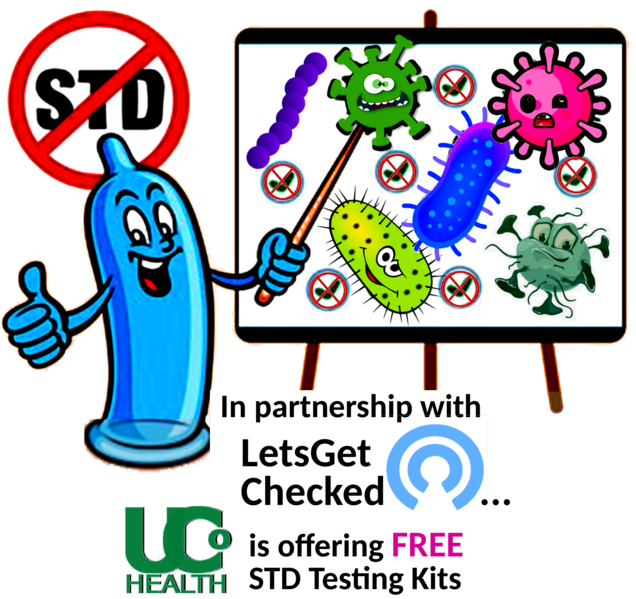If you are concerned about a possible STD, you can contact UCo Health at 541 278-6290.
UCoHealth provides screening and treatment for sexually transmitted infections including Chlamydia, Gonorrhea, Syphilis, Hepatitis C, Hepatitis B and HIV. Please contact the Umatilla County Health Office near you for more information.
If you need to notify a partner of an infection you can now do so anonymously at this website.
Additionally, if you are in need of condoms you can get them for free! through OHA's EndHIV Program. Just click the EndHIV image to go directly to their website at onecondoms.com/oregon.
Sexually Transmitted Diseases, also known as STI or STD

What is Chlamydia? Chlamydia trachomatis is a type of bacterium that causes the common sexually transmitted infection often referred to as Chlamydia. It is the most common STD caused by bacteria. Women between ages 15 and 24 are the most likely to be newly infected with chlamydia, but anyone male or female who is sexually active can be infected. Infections can establish themselves in the urethra, vagina, cervix, rectum, and throat. Chlamydia is a disease that you can get multiple times.
How can chlamydia be spread? Chlamydia is most commonly spread through sexual contact. Oral, anal, and vaginal sex with an infected individual can put you at risk for chlamydia. You can still get chlamydia even if your sex partner does not ejaculate. Additionally, a pregnant person with chlamydia can pass on the infection to their baby during childbirth which can cause eye and lung infections in the newborn.
What are the symptoms of chlamydia? Chlamydia often does not have any symptoms, but it can still cause serious health problems. Symptoms also may not even appear until several weeks after sexual contact. Even when symptoms are not present, chlamydia can still be transmitted through sex. Women with symptoms may notice abnormal and foul smelling vaginal discharge, stinging or burning sensation with urination, bloody urine, vaginal bleeding between periods, and/or an unusual genital sore. Most men with chlamydia do not experience symptoms. Those with symptoms may notice foul smelling penile discharge, stinging or burning sensation with urination, bloody urine, penile sore(s), and/or pain and swelling in one or both testicles. Pharyngeal chlamydia is characterized by a sore throat, oral sores, and/or mouth pain. Rectal chlamydia is characterized by rectal pain, redness and discharge from the anus, and/or painful bowel movements.
What happens if I don’t get treated? Early during infection there is only superficial damage that often goes unnoticed. Prolonged infection can lead to serious health complications in women often resulting in pelvic inflammatory disease (PID). PID is associated with long-term pelvic and abdominal pain and infertility due to formation of scar tissue in the reproductive organs and high risk for ectopic pregnancy (pregnancy that occurs outside the womb making the fetus inviable). Men rarely have long-term health effects from chlamydia but can develop epididymitis (swelling and pain in the tubes that are attached to the testicles) and this can lead to infertility in rare cases. Untreated chlamydia may also increase your risk of getting or giving HIV. Lastly, long-term, untreated chlamydia is the number one cause of reactive arthritis in the United States for both men and women. Reactive arthritis is characterized by redness, stiffness, and pain in numerous joints in the body from high levels of inflammation.
What should I do if I want to get tested for chlamydia? Call UCo Health at 541-278-5432 to schedule an appointment to get tested. At this appointment, a nurse will get you set up with the materials to be tested. We provide options for urethral, anal, and pharyngeal chlamydia testing. Once the labs are resulted, a nurse will call you with the results, as well as get you set up with the appropriate treatment if you test positive. Treatment for chlamydia does require antibiotic therapy.
How can I protect myself? The best thing you can do to protect yourself is to avoid situations that put you at high risk. Some examples of ways you can do this is by:
- Limiting your number of intimate partners.
- Getting regular testing if you are sexually active, even if you are engaging in safe sex practices.
- Asking your sex partners to get tested for STDs prior to engaging in sexual activity.
- Wearing a condom (latex or polyurethane) when engaging in sexual activities of any kind.
To learn more about chlamydia, visit: https://www.cdc.gov/std/chlamydia/stdfact-chlamydia.htm

What is gonorrhea? Neisseria gonorrhoeae is a type of bacterium that causes the sexually transmitted infection often referred to as gonorrhea. It is the second most common STD caused by bacteria. It is most common in young people ages 15-24, affecting both men and women. Infections can establish themselves in the urethra, vagina, cervix, rectum, and throat. Gonorrhea is a disease that you can get multiple times. Currently, it is of high health concern because of its progressive resistance to antibiotic drugs.
How can gonorrhea be spread? Gonorrhea is most commonly spread through sexual contact. Oral, anal, and vaginal sex with an infected individual can put you at risk for gonorrhea. You can still get gonorrhea even if your sex partner does not ejaculate. Additionally, a pregnant person with gonorrhea can transmit the infection to their baby during childbirth which can lead to a severe eye infection in the newborn.
What are the symptoms of gonorrhea? Gonorrhea often does not have any symptoms, but it can still cause serious health problems. Symptoms also may not even appear until several weeks after sexual contact. Even when symptoms are not present, gonorrhea can still be transmitted through sex. Most women with gonorrhea do not develop symptoms. Women with symptoms may notice abnormal and foul smelling vaginal discharge that is white, yellow or green in color, stinging or burning sensation with urination, bloody urine, vaginal bleeding between periods, and/or an unusual genital sore. Men with symptoms may notice foul smelling penile discharge that is white, yellow or green in color, stinging or burning sensation with urination, bloody urine, penile sore(s), and/or pain and swelling in one or both testicles. Pharyngeal gonorrhea is characterized by a sore throat, redness in mouth or throat, and/or swollen lymph nodes in the neck. Rectal gonorrhea is characterized by rectal pain or bleeding, anal itching, discharge from the anus, and/or painful bowel movements.
What happens if I don’t get treated? Early during infection there is only superficial damage that often goes unnoticed. Prolonged infection can lead to serious health complications in women often resulting in pelvic inflammatory disease (PID). PID is associated with long-term pelvic and abdominal pain and infertility due to formation of scar tissue in the reproductive organs and high risk for ectopic pregnancy (pregnancy that occurs outside the womb making the fetus nonviable). Men rarely have long-term health effects from gonorrhea but can develop epididymitis (swelling and pain in the tubes that are attached to the testicles) and this can lead to infertility in rare cases. Lastly, long-term, untreated gonorrhea can spread to the joints and in the blood. If it does move into the blood, this can be life threatening. In the joints, gonorrhea can cause reactive arthritis. Reactive arthritis is characterized by redness, stiffness, and pain in numerous joints in the body from high levels of inflammation. Untreated gonorrhea may also increase your risk of getting or giving HIV.
What should I do if I want to get tested for gonorrhea? Call UCo Health at 541-278-5432 to schedule an appointment to get tested. At this appointment, a nurse will get you set up with materials for testing. We provide options for urethral, anal, and pharyngeal gonorrhea testing. Once the labs are resulted, the nurse will call you with the results and will get you set up with the appropriate treatment if you test positive. Treatment for gonorrhea does require antibiotic therapy. If you would like a more private option, please refer to the top of this webpage for information on our LetsGetChecked program.
How can I protect myself? The best thing you can do to protect yourself is to avoid situations that put you at high risk. Some examples of ways you can do this is by:
- Limiting your number of intimate partners.
- Getting regular testing if you are sexually active, even if you are engaging in safe sex practices.
- Asking your sex partners to get tested for STDs prior to engaging in sexual activity.
- Wearing a condom (latex or polyurethane) when engaging in sexual activities of any kind.
To learn more about gonorrhea, visit: https://www.cdc.gov/std/gonorrhea/stdfact-gonorrhea.htm

What is syphilis? Syphilis is a sexually transmitted infection caused by the bacterium Treponema pallidum. It is the third most common STD caused by bacteria. Syphilis is most common in young adults ages 20-35, affecting both men and women. Infections can establish themselves in the urethra, penis, vagina, anus, rectum, and lips/mouth. Syphilis is a disease that you can get multiple times. This infection is of high health concern because it can affect several important body systems and fails to respond to most antibiotics. The primary treatment for syphilis is penicillin G. Even if an individual has a penicillin allergy, it is recommended that they still receive this antibiotic, but are placed on steroids to decrease risk of an allergic reaction.
How can syphilis be spread? Syphilis is spread through sexual contact. Oral, anal, and vaginal sex with an infected individual can put you at risk for syphilis infection. You can still get syphilis even if your sex partner does not ejaculate. If an individual has sores in their mouth, transmission can occur while kissing, although this has a much lower risk for transmission compared to oral sex. Syphilis can be spread during the primary, secondary, and early latent stages. Additionally, syphilis can cross the placental barrier, meaning a pregnant person with syphilis can transmit the infection to their fetus (congenital syphilis). Syphilis cannot be spread through casual contact with objects like toilet seats, doorknobs, swimming pools/hot tubs/bathtubs, or by sharing clothing.
What are the symptoms of syphilis? Syphilis is a disease that is made up of four stages (primary, secondary, latent, and tertiary). Each of these stages present differently. In the primary stage, one or more firm, round, and painless sores may appear in, on, or around the genitals, anus, rectum, lips or in the mouth lasting usually between 3 to 6 weeks and then disappear. Since the sores are painless, they often go unnoticed. In the secondary stage, a red or reddish-brown rash may appear on one or more areas of the body when the primary stage sores are healing or fully healed. The rash typically does not itch and can be very faint in appearance, also allowing it to go unnoticed. Additional symptoms in the secondary stage include fever, swollen lymph nodes, sore throat, patchy hair loss, body aches, and fatigue. The latent stage of syphilis is a period of time during infection when there are no visible symptoms present. The latent stage can last for weeks to years. In the tertiary stage, several body organ systems can be affected like the brain (Neurosyphilis), eyes (Ocular syphilis), and ears (Otosyphilis), although reaching tertiary syphilis is rare. Neurosyphilis is characterized by severe headache, muscle weakness, trouble controlling muscle movements, and changes in mental state like confusion, personality changes, memory issues, and issues with decision making or rational thinking. Ocular syphilis is characterized by redness and pain in the eyes, as well as vision changes or blindness. Otosyphilis is characterized by hearing loss, ringing in the ears, and dizziness/vertigo. Lastly, congenital syphilis can lead to low birth weight, premature delivery, miscarriage, and stillbirth. Once born, babies with syphilis can experience cataracts, deafness, seizures, or death.
What happens if I don’t get treated? If a syphilis infection goes untreated, the progression of disease will continue through the various stages and put you at higher risk for developing long term organ damage. Keep in mind that treatment might not undo any damage already caused by the infection. This is why it is extremely important to get treatment as early as possible. Because syphilis can be spread during three different disease stages, you put your sex partners at high risk of acquiring this disease. Untreated syphilis in pregnant people put the fetus and/or newborn at high risk for permanent health issues or death. Untreated syphilis may also increase your risk of getting or giving HIV.
What should I do if I want to get tested for syphilis? Call UCo Health at 541-278-5432 to schedule an appointment to get tested. At this appointment, a nurse will draw blood to check for Treponemal antibodies as well as body damage markers associated with syphilis. Once the labs are resulted, the nurse will call you with the results and will get you set up with the appropriate treatment if you test positive. Treatment for syphilis does require antibiotic therapy. If you would like a more private option, please refer to the top of this webpage for information on our LetsGetChecked program.
How can I protect myself? The best thing you can do to protect yourself is to avoid situations that put you at high risk. Some examples of ways you can do this is by:
- Limiting your number of intimate partners.
- Getting regular testing if you are sexually active, even if you are engaging in safe sex practices.
- Asking your sex partners to get tested for STDs prior to engaging in sexual activity.
- Wearing a condom (latex or polyurethane) when engaging in sexual activities of any kind to decrease risk of contact with primary stage sores. Keep in mind that sores can sometimes occur in areas of the body not covered by a condom and contact with these areas can still transmit syphilis.
- If you are pregnant, request testing at your prenatal visit.
To learn more about syphilis, visit: https://www.cdc.gov/std/syphilis/stdfact-syphilis.htm
To learn more about congenital syphilis, visit: https://www.cdc.gov/std/syphilis/stdfact-congenital-syphilis.htm

What is HIV? Human Immunodeficiency Virus (HIV) is a retrovirus that can be spread through exposure to sexual fluids or contact with contaminated blood. There are two subtypes of the virus: HIV-1 and HIV-2. HIV affects numerous age ranges, but young people ages 13 to 24 make up a large portion of newly diagnosed cases over the last several years. While HIV infections are commonly associated with urban areas, it is not just a “big city” issue and does have prevalence within rural areas. Once a person is diagnosed with HIV, they carry this disease for life. HIV infects the body by entering and killing certain immune system cells. By doing this, they themselves get to avoid the immune system which is why our bodies cannot clear the infection. After they kill many immune cells over a long period of time, the immune system becomes very weak, allowing other viruses, fungi, and bacteria to start separate infections that you can no longer fight off on your own. HIV infections are of high health concern because untreated infects can lead to Acquired Immunodeficiency Syndrome (AIDS), as well as its association with several different types of cancers. There is no cure for HIV infection, but there are numerous medications available that keep you healthy, protect your sexual partners and live a long, healthy life. Long-term, effective medications can get your viral load to an undetectable status, meaning no viral particles can be found in the blood. When an individual has an undetectable viral load, that means they can no longer pass on HIV to others. UNDETECTABLE = UNTRANSMITTABLE.
How can HIV be spread? HIV is spread through sexual contact with body fluids from an HIV+ individual with a detectable viral load (virus can still be detected in a blood sample). Unprotected vaginal or anal sex can put you at high risk. Oral sex transmission is extremely rare. You can still get HIV even if your sex partner does not ejaculate. HIV can also be spread by sharing needles, syringes, or other injection equipment with an HIV+ individual with a detectable viral load. Transmitted from an HIV+ pregnant person to their baby during pregnancy, birth, or by breastfeeding is possible. However, HIV prevention and treatment is improving, thereby decreasing risk of mother to child transmission.
What are the symptoms of HIV? HIV is a disease that is made up of 3 stages. During stage 1, or the acute HIV infection phase, HIV levels are high in the blood resulting in flu-like symptoms. During stage 1, infection is most contagious. During stage 2, or the chronic HIV infection phase, people tend to be asymptomatic. HIV is still active and present in blood samples and therefore can still be transmitted. Lastly, during stage 3, or AIDS, individuals have severely depleted immune systems and are highly susceptible to secondary infections that can be life threatening. HIV can still be easily transmitted during AIDS.
What happens if I don’t get treated? If a HIV infection goes untreated, the progression of disease will continue through the various stages and put you at higher risk for developing AIDS. The severe damage seen in AIDS leaves you susceptible to pneumonia, meningitis, and many other serious diseases that can be fatal, even with medical attention. Cytomegalovirus infections are common in those with AIDS and can cause serious problems with the eyes, lungs, and gastrointestinal tract. Cancer development is more likely when the immune system is damaged. Kaposi sarcoma (skin cancer), non-Hodgkin lymphoma (lymph node cancer) and cervical cancers are commonly associated with HIV infections.
What should I do if I want to get tested for HIV? Call UCo Health at 541-278-5432 to schedule an appointment to get tested. At this appointment, a nurse will draw blood to check for HIV-1/HIV-2 antibodies. If the labs demonstrate a positive result, follow up testing will need to be completed to check viral load (how much virus is detectable in the blood) and check the levels and percentages of immune cells. We do not manage HIV care at our clinics, but we do refer out to primary care physicians and infectious disease specialists to get you set up with the right medications.
What are some community resources if I am newly diagnosed with HIV and have financial/insurance troubles? Eastern Oregon Center for Independent Living (EOCIL) has numerous community resources specific to those diagnosed with HIV. They offer HIV prevention, harm reduction, testing and counseling services. They also have case managers that can help you plan and manage your healthcare. Housing services and insurance enrollment assistance services are also available through EOCIL. For contact information regarding these EOCIL HIV services, visit:
https://www.eocil.org/#/home.
How can I protect myself? The best thing you can do to protect yourself is to avoid situations that put you at high risk. Some examples of ways you can do this is by:
- Limiting your number of intimate partners.
- Getting regular testing if you are sexually active, even if you are engaging in safe sex practices.
- Asking your sex partners to get tested for STDs prior to engaging in sexual activity.
- Wearing a condom (latex or polyurethane) when engaging in sexual activities.
- Talk to your doctor about pre-exposure prophylaxis medication (PrEP)
- Do not share injection equipment like needles and syringes.
To learn more about HIV, visit: https://www.cdc.gov/hiv/basics/index.html.

What is hepatitis C? The hepatitis C virus (HCV) is a virus that can cause inflammation and tissue damage in the liver. This disease appears to be highly prevalent in people aged 20-39 years. Hepatitis C is often slow in progression, meaning you could have it for a long period of time without knowing it. Chronic hepatitis C can cause long-term, irreversible health problems. It is the number one reason in the United States why a person would need a liver transplant. It is possible for someone with hepatitis C to get better without treatment, but about 70% of cases will develop the chronic condition. Contracting HCV also puts you at high risk for contracting HIV. Treatment consists of medication therapy for about 8 to 12 weeks. Current medications have a 90% cure rate with few side effects. Most medications are only available to those 3 years or older.
How can hepatitis C be spread? Hepatitis C is most commonly spread through the sharing of drug-injection equipment like needles and syringes because it is a bloodborne pathogen. The more rare types of transmission include sexual contact, unregulated tattoos or body piercings, and birth. Approximately 6% of all HCV infections are from mother to child transmission during pregnancy.
What are the symptoms of hepatitis C? An acute (early onset) HCV infection is characterized by fever, fatigue, dark urine, “clay-colored” stool, abdominal pain, nausea and vomiting, joint pain, and jaundice (yellowing of the skin and eyes). Acute hepatitis C symptoms usually appear anywhere from 2 to 26 weeks from exposure. A chronic (long-term) HCV infection can often be asymptomatic. Slowly overtime, the infection can progress leading to mild to severe chronic liver disease, cirrhosis, and liver cancer.
What happens if I don’t get treated? If a HCV infection goes untreated, permanent liver damage can occur leading to the need for liver transplantation. Risk of developing liver cancer also becomes high. Other extrahepatic (outside the liver) diseases can manifest as a result of untreated hepatitis C like diabetes mellitus, glomerulonephritis (inflammation and damage to the kidneys), essential mixed cryoglobulinemia (abnormal blood proteins that can damage numerous organs), and porphyria cutanea tarda (blisters that appear on the skin when exposed to sunlight).
What should I do if I want to get tested for HCV? Call UCo Health at 541-278-5432 to schedule an appointment to get tested. At this appointment, a nurse will draw blood to check for hepatitis antibodies and presence of viral RNA in the blood. Once the labs are resulted, a nurse will call with your results and refer you to the right places to start hepatitis C therapy if you test positive.
How can I protect myself? Unfortunately, there is no vaccine that exists for hepatitis C at this time. The best thing you can do to protect yourself is to avoid situations that put you at high risk. Some examples of ways you can do this is by:
- Do not share injection equipment like needles and syringes.
- Limiting your number of intimate partners.
- Getting regular testing if you are sexually active, even if you are engaging in safe sex practices.
- Asking your sex partners to get tested prior to engaging in sexual activity.
- Wearing a condom (latex or polyurethane) when engaging in sexual activities.
To learn more about HCV, visit: https://www.cdc.gov/HCV/basics/index.html
What is hepatitis B? The hepatitis B virus (HBV) is a virus that can cause inflammation and tissue damage in the liver. HBV infection can be either acute (short-term) or chronic (long-term). This disease appears to be highly prevalent in people aged 30-59 years. However, the younger an individual is when infected, the more likely they are to develop a chronic infection. About 90% of unvaccinated, HBV-infected newborns will develop a chronic hepatitis B infection. Chronic hepatitis B can cause long-term, irreversible health problems. Contracting HBV also puts you at high risk for contracting HIV. There is no cure, but treatment consists of antiviral medication therapy which can slow the rate of liver damage.
How can hepatitis B be spread? Hepatitis B can be spread in multiple ways. Hepatitis B can be spread through sexual fluids during unprotected sex. Additionally, it is a bloodborne pathogen meaning it can be spread by sharing drug-injection equipment like needles and syringes, as well as contact with open wounds from an individual infected with HBV. The more rare types of transmission include sharing of personal items like toothbrushes and shaving razors. Lastly, a pregnant person with HBV can transmit the virus during birth.
What are the symptoms of hepatitis B? An acute (early onset) HBV infection is characterized by fever, fatigue, dark urine, “clay-colored” stool, abdominal pain, nausea and vomiting, joint pain, and jaundice (yellowing of the skin and eyes). Acute hepatitis B symptoms usually appear within the first 3 months from exposure. Children under 5 and those who are immunocompromised typically do not demonstrate any symptoms. About half of older children, adolescents, and adults do show symptoms during acute infection, while the other half have no or very mild symptoms. Symptoms during this stage can last up to 6 months. A chronic (long-term) HBV infection can often be asymptomatic for decades. Slowly overtime, the infection can progress leading to mild to severe chronic liver disease, cirrhosis, and liver cancer.
What happens if I don’t get treated? If a HBV infection goes untreated, permanent liver damage can occur leading to the need for liver transplantation. Risk of developing liver cancer also becomes high. Other extrahepatic (outside the liver) diseases can manifest as a result of untreated hepatitis B like arthritis, glomerulonephritis (inflammation and damage to the kidneys), polyarteritis nodosa (autoimmune vascular disease), and porphyria cutanea tarda (blisters that appear on the skin when exposed to sunlight). About 1 in 4 unvaccinated infants born with hepatitis B will die prematurely.
What should I do if I want to get tested for HBV? Call UCo Health at 541-278-5432 to schedule an appointment to get tested. At this appointment, a nurse will draw blood to check for hepatitis B antibodies. Once the labs are resulted, a nurse will call with your results and refer you to the right places to start hepatitis B therapy if you test positive.
How can I protect myself? There is a vaccine that exists for hepatitis B, so vaccination is a great way to reduce your risk. Call UCo Health at 541-278-5432 to schedule your vaccine if you have not yet received one. Vaccination is wonderful, but the best thing you can do to protect yourself is to avoid situations that put you at high risk. Some examples of ways you can do this is by:
1. Not sharing injection equipment like needles and syringes.
2. Limiting your number of intimate partners.
3. Getting regular testing if you are sexually active, even if you are engaging in safe sex practices.
4. Asking your sex partners to get tested prior to engaging in sexual activity.
5. Wearing a condom (latex or polyurethane) when engaging in sexual activities.
6. Not sharing personal care items like toothbrushes and shaving razors.
7. Only getting tattoos and piercing through registered businesses.
To learn more about HBV, visit:
https://www.cdc.gov/hepatitis/hbv/bfaq.htm#overview
https://www.hhs.gov/hepatitis/learn-about-viral-hepatitis/hepatitis-b-basics/index.html#:~:text=for%20possible%20treatment.-,How%20Many%20People%20Have%20Hepatitis%20B%3F,around%203%2C000%20cases%20per%20year.





